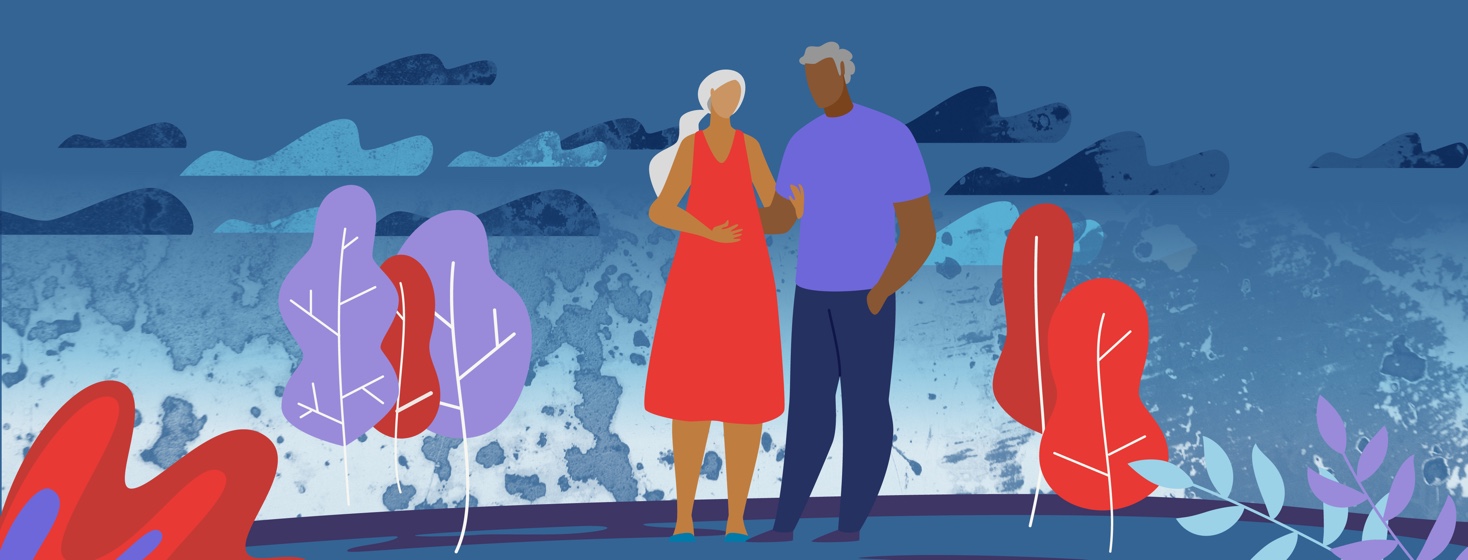ATM Mutation, Part 3 - My Spouse
At the time of my de novo metastatic diagnosis in mid-2017, my husband and I had been together for nearly 12 years and had been married for nearly ten 10. We have two boys, who were then nearly 2 and nearly 4 (they are now 6 and 4).
We were thinking about the possibility of a third child (we thought a girl would complete our family perfectly) and I was still tandem breastfeeding (meaning breastfeeding both boys at the same time). We weren't thinking about an illness or the end of our lives, except in general terms for estate planning and retirement purposes.
And then, we were thrust into a world that looked very different from what we were used to and the trajectory of our lives together changed irrevocably.
The relationship changed overnight
Overnight, my husband was married to a very sick wife who was told not to walk until surgery (during chemo) and he then became the only employed person in our family, carrying the health insurance that would help keep me alive. It is hard to adequately explain how drastically our relationship changed immediately after hearing those dreaded words.
We have always been full partners, weathering the changes in life and our jobs together. Once I was diagnosed, there were so many things I couldn't do any longer and being able to look into the future with any kind of hope was a major initial casualty.
My husband had to learn to look at the world in a different way and he had to adjust to the fact that our partnership was no longer the same. The discovery that I am positive for the ATM germline mutation didn't change how we viewed (and continue to view) my cancer other than confirming that cancer was beyond our control.
Since children are often very negatively affected when both parents are positive for the same mutation, we had my husband undergo genetic testing as soon as possible. He is negative, which was a huge source of relief for us both.
Changes for my family after my MBC diagnosis
Caring for family and living up to family expectations is written in my DNA and so it was with my husband, despite the fact that we come from very different parts of the world and from very different cultures--I'm a WASP and my husband is a dark-skinned Jamaican.
My husband and I, we think very similarly about a lot of things, the most important things, and I didn’t worry my husband would leave when things got hard. I didn’t worry that he would shirk his responsibilities when our lives changed so drastically. I didn't worry that he wouldn't honor his vows.
Not only did my husband not leave me, but when my family suggested that we move to be with them so that they could help support the entire family, he agreed. He agreed to move in with his in-laws.
I’m not sure that many men would have agreed to do that, even with a terminal diagnosis, and I'm not sure I would do as well if the shoe was on the other foot. Yet, that is exactly what my husband agreed to do and did.
Shows love and concern
My husband shows his love and concern for me in a variety of ways, every day. When it comes to my cancer, he is about as interested as I am in the current research (and that's saying something) and he has accompanied me as my caregiver to a variety of events, including the Die in and Stampede in Washington DC in 2018 and 2019.
He’s always up for helping with the boys after he's worked a full day at the office and he does not fuss about any of the funds I spend on complementary care for the host of ongoing side effects I’m managing.
He tells me regularly that he would prefer that I spend money on myself rather than sending funds or gifts to the many people I want to and yes, I have a problem with wanting to help more people than I reasonably can.
He shows up and continues to show up.
Thankless job
It’s a hard, thankless job to watch the person you love suffer. It is a hard, thankless job to know and understand that the person you love is terminal. Caregivers are so often forgotten and they often don’t get the support they need. Cancer happens to everyone in a family when a person within that family is sick.
The people in the most intimate relationship with the person who is sick, I believe, are often affected the most. And yet, they often ask for help the least. Those of us who are dealing with the weight of being terminal can often forget that we need to remember that the people in our lives showing us the most support often need something very different from us - permission to have needs of their own outside of cancer.
Give support
Give the people in your life permission to have needs and permission to get those needs met. One of the things that my husband and I agreed to at the beginning was that he would remain supported by his own therapist.
It has been invaluable in a lot of ways that he has a sounding board, a person who is solely devoted to his mental health and how he's coping. I realize this isn't always possible, but it's oh so necessary.
Editor's note: Check out three other articles in Abigail's ATM Mutation series. Part 1 that where Abigail shares about her genetic testing experience, ATM Mutation, part 2 – My Sister, who is also positive for the ATM Mutation and part 4, an interview with her dad.

Join the conversation